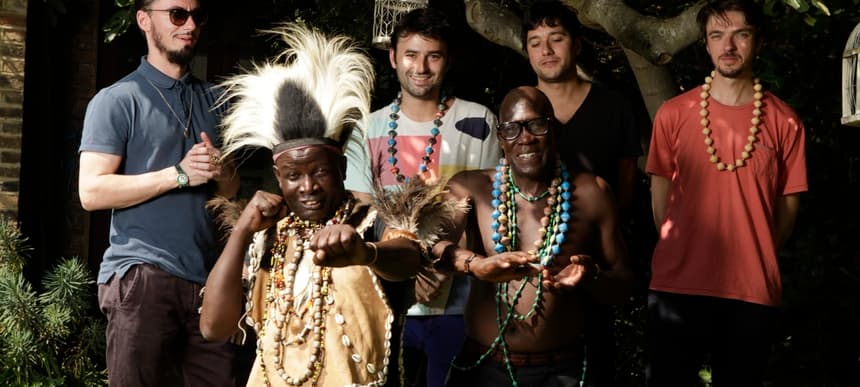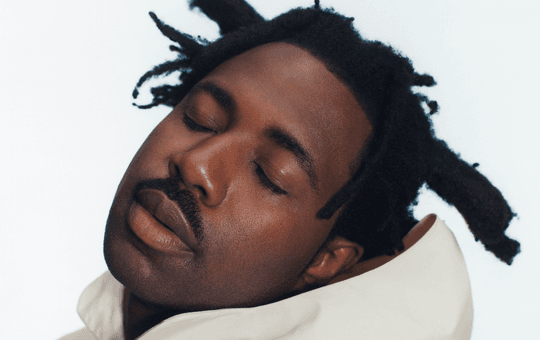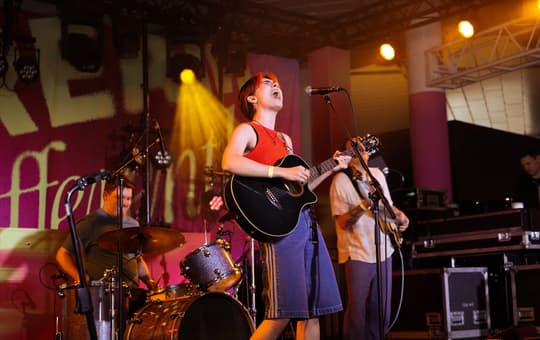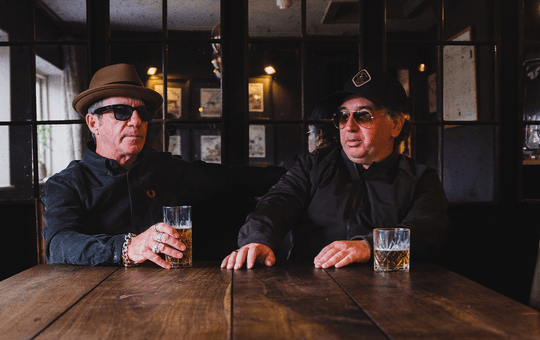
Owiny Sigoma Band: "Hey, I can write happy music as well!”
“We built up a relationship with them over time, so it became more easy to make suggestions. And they were always cool with it, that was the surprising thing.” Sat on the pavement across from Rough Trade East before a screening of the mini-documentary about the making of their new LP, Jesse and Louis Hackett tell me how the dynamic between the band’s British and Kenyan contingents has gradually shifted over the course of the three albums they’ve now released.
Their latest is titled after Kenya’s northern Nyanza province, home to band members Joseph Nyamungu, Charles Owoko and the traditional nyatiti music of which they’re well established practitioners. The three British members of the band – Jesse, Louis and drummer Tom Skinner – visited the region for the first time last year to make the new album, finding in the process that the place itself was a good way to frame the music that came out of the trip.
Hearing that the relationship between the band’s two halves has become more relaxed since their first release together three years ago is unsurprising, maybe, and not least because ‘Nyanza’ feels like the most accomplished record they’ve put their name to so far. The album threads together echoey dub production, atmospheric field recordings and the ever-reliable thud of Owoko’s nyiduonge drums into one whole that’s as wonderfully porous as you’d want this kind of cultural exchange to be.
There’s a very audible sense of the places you were recording in when listening to the record. Do you feel that going to Nyanza had a big impact on the recording process compared to the previous times in London and Nairobi?
Louis: “Yeah and just being able to have the mobile studio and record in different spaces. Like you say, having those different elements that were playing into the tracks created quite an atmosphere. In that sense of all the different sounds that have become quite sewn into the fabric of the album, definitely."
“I suppose we could’ve been in a lot of different places that had interesting sonics, but just getting a chance to go to the rural areas that we’ve been talking about for a long time – getting to go to Joseph and Charles’ village and meet all of the elders – I think that was quite a powerful experience for all of us and definitely gave us a lot of food for thought.”
This record’s been compared to the Mbongwana Star album which came out earlier this year. When I interviewed Doctor L, who produced that album, he said not being sacred with the music is important in working with musicians from Africa. Would you agree with that?
Jesse: “We’ve never been very concerned about stepping to it in a kind of musicologist or anthropologist kinda way. That said, we have tried to keep elements of the recording very pure. So you can hear on the first record, for example, those tracks where we decided not to play at all because we wanted to hear what it sounded like when just those guys played."
“And that’s the initial thing that got us inspired anyway. They’re playing a form of music with a whole different system of tunings and rhythms and stories and, obviously for us, we’re very intrigued by it ‘cause it’s something very different for us. But I think from the very beginning the Kenyan guys have encouraged us to show them about our music as well. So it just became a bit of an exchange of ideas, rather than us recording their music.”
Louis: “I think, also, Joseph and Charles have evolved through the whole process of the band. Getting Nyumungo to turn into a superstar rapper over 160bpm techno is definitely something that’s pulled him out of what he’s used to.”
Jesse: “Normally speaking, he’d always play with his nyatiti as his accompaniment. By the time we got to the second album, it was suggested in quite a gentle manner that maybe, as we were gonna be playing on big stages, it might help the show if he stood up. And we did some tracks where he wasn’t on the nyatiti on every song.”
Louis: “To be fair, we actually did a lot of songs where we decided to strip the nyatiti out. We’ve never been too sacred about any of the stuff that’s gone down. In the end, we take it back to the studio and see what’s working. We’ve never been too precious about it.”
Jesse: “When we first went to Kenya, we were a lot more timid and, not apprehensive, but we were really just trying to find a way to fit around their music. We were really all ears – like, for example, we instantly realised that the instruments weren’t tuned to a Western tuning. But rather than getting out our tuners and saying, “We’re not gonna be able to play with you unless you tune to us,” we tuned to them, from the very beginning. And that’s the way that we came into it.”
Louis: “We’re still trying to work that tuning out now!”
With all the different influences that are present in this and the previous albums, it’s surprising in a way that a lot of the music would be best described as pop.
Jesse: “As the lyricist for most of the English side of the music, I’ve always been interested in a pop form in one form or another."
“But I think that what’s interesting for me, is that I remember when I wrote Wires, it was the first time I’d ever thought to write a song over an African-style thing. Like the highlife guitar riff and all of that. But I think that there’s something really joyous and uplifting about their music, and it was a great challenge to try and write a lyric to something like that.”
Louis: “Hey, I can write happy music as well!”
Jesse: “Yeah, rather than always being in minor keys and being down on myself.”

The influence of dub also seemed very noticeable in the production of ‘Nyanza’.
Jesse: “Well, we’re all dub fans. I’m a big fan of Lee Scratch Perry and all that great ‘70s Jamaican music. So we’ve all grown up on that sorta stuff.”
Louis: “And one of the main recording spaces we used was run by a guy called Jah Mic. He was a rasta guy who had this sort of compound and cultural centre up in the hills of Nyanza. His space was just really inspiring; it was one of the first places where we hit record, so I think that also had a knock-on effect.”
Jesse: “I actually worked quite hard on that Jah Mic track and I was definitely hearing a kind of Lee Scratch Perry ‘Super Ape’-esque production going on. But actually, what it was was that we’d been recording in a room that was really echoey anyway, so I just thought, push that even further and take it there completely.”
That dub influence is obviously very rooted in studio production. But is recording and production something that Joseph and Charles have ever got involved with much before previously? I get the impression that Luo music might generally be rooted in more of a live tradition.
Jesse: “Yeah, I think you’re right, they certainly are live musicians. They had done a few studio sessions in the past, and odd CDs and things would turn up from things they’d done. But generally speaking I think it’s much more of a music which is about recreation, downtime, family get togethers. It has a social function.”
Louis: “There’s a real oral tradition around it. What we actually discovered when we did this rural concert in Nyanza, we saw the strength of that oral tradition in the call-and-response element of the music. There’s all these old folk tunes which are recorded in the format of call-and-response tradition. Back in Nairobi, there was a feeling that nyatiti music was something that was only played by older people with the younger generation not embracing it so much. But when we got to Nyanza, we witnessed a real next generation of young players coming through.”
You mentioned previously adapting to their tuning. How d’you think you have adapted and incorporated different styles and rhythms over the three albums?
Jesse: “It’s been a bit of both ways, really.”
Louis: “They try to make us swing, and we try to make them go square [laughs].”
Jesse: “The real key factor in the whole thing is the relationship between Tom Skinner and Charles. When we first met them, there was this instantaneous connection between the two of them and Charles was genuinely taken aback by how fast Tom got a sense of the rhythms. He’d never seen a white person be able to play like that before, I don’t think. They just became drum brothers straight away, really. Drum lovers. I mean, there’s been times when we’ve come with certain ideas and they’ve been like, “No, [that’s a] West African rhythm.” But I mean, other things they’ve liked. They’ve got their rhumba, slower rhythms and the more upbeat, uptown rhythms. Generally speaking, what the nyiduonge drum plays is just one of the sticks playing a four-to-the-floor sort of thing, and he just plays off it. So it’s a pretty universal beat, really. It could be dance music. It’s a very driving, ground rhythm."
Owiny Sigomy Band's album 'Nyanza' is out now Brownswood Recordings (buy / stream).













